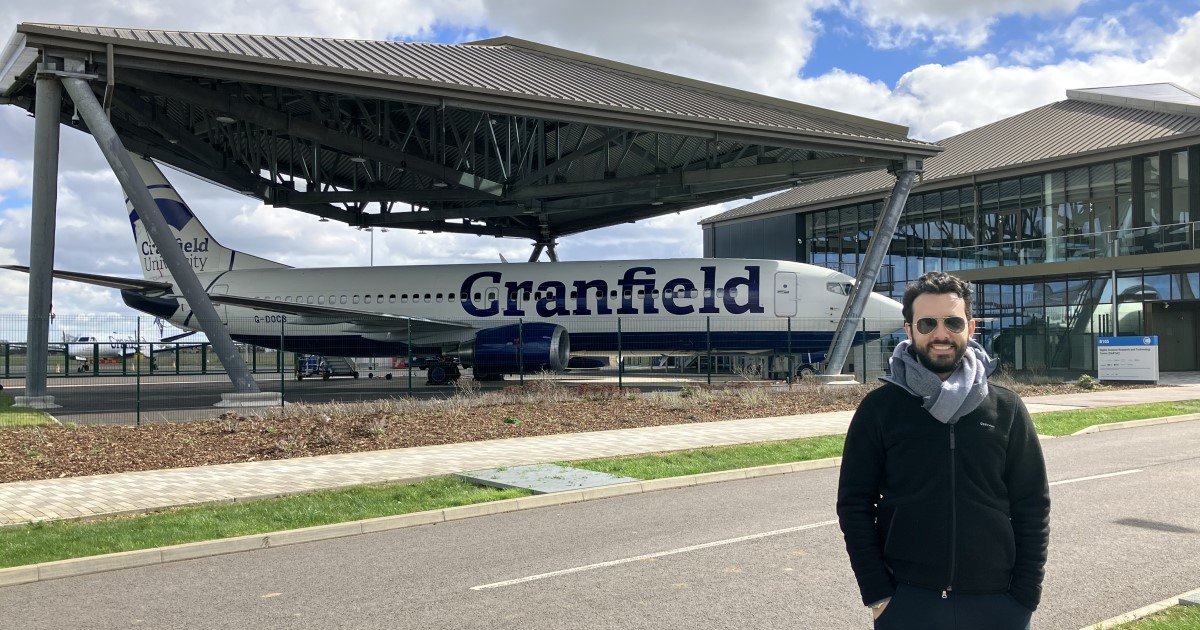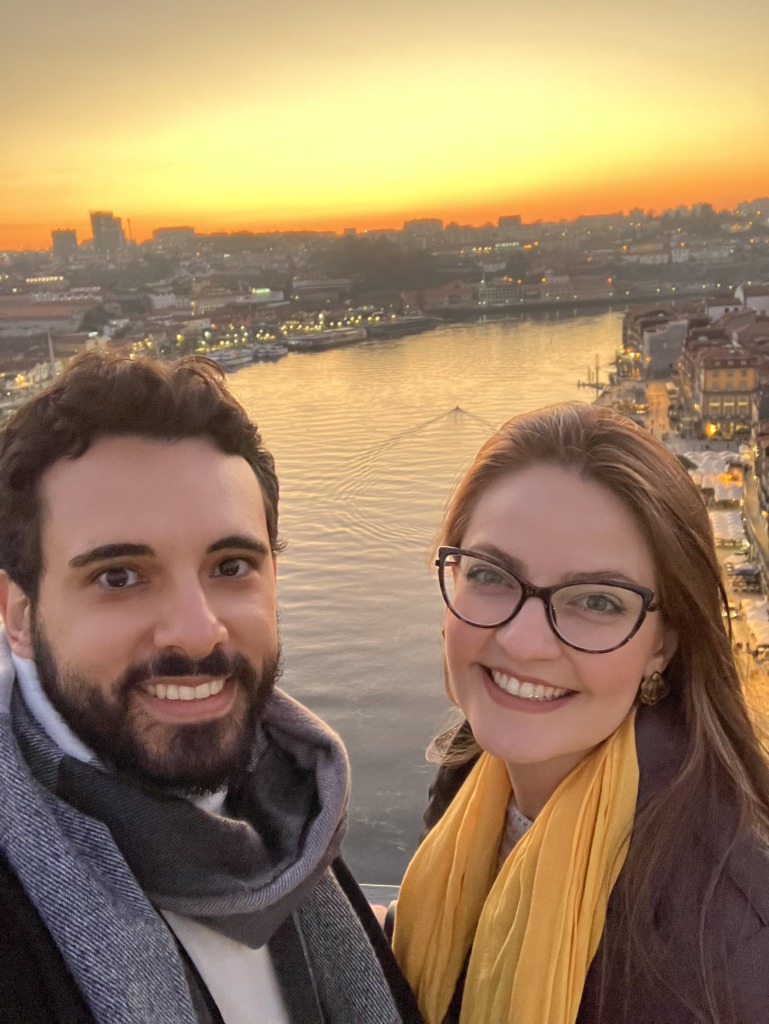Safety and Human Factors in Aviation MSc student Joao Paulo talks about his passion for aircraft safety
29/03/2023

Joao Paulo Costa Antunes De MacEdo is studying for an MSc in Safety and Human Factors in Aviation. Here, he talks about what led him to become interested in studying aircraft safety, how he is finding his course so far, and his future career plans.
What sparked your interest in safety and human factors?
I’ve always been passionate about aircraft (in fact, this was the first word I wrote – but in my native language, Portuguese) and my uncle was a pilot when I was a child, so for a while I considered becoming a military pilot, but the Brazilian Air Force did not accept short-sighted people at that time and then I decided to undertake my studies in aeronautical engineering.
However, even before starting my studies, when I was 15 years old an accident happened near to my parents’ apartment in Sao Paulo, Brazil, and that event triggered my interest to help mitigate accidents and make aviation safer. On top of that, during my bachelor’s degree, I realised that, instead of specialising myself in a very tiny piece of an aircraft, I was much more interested in the whole picture, in understanding how things connect to each other and work together, and hence I realised that studying how accidents happen could give me the opportunity to see things from a broader picture.
Finally, I worked with test pilots back in Brazil and this was the moment when I became enchanted with how humans and machines work together. I really wanted to learn more about how accidents happen, how they can be mitigated, what our cognitive limitations are as human beings, and how we can help humans and machines do a safer job together. I guess this is how I became interested in safety and human factors.
Can you tell us a little bit about your life before coming to Cranfield?
Immediately before coming to Cranfield, I was working for a company called EATON on optimisation of gearboxes. However, before that, I also worked for Embraer, the Brazilian aircraft manufacturer, and did a master’s degree in mechanical engineering. This was when I worked on the development of a flight simulator at the University of Sao Paulo, Brazil, and had the chance to meet and work with different pilots.
On the personal side, my family was facing a very challenging moment due to a health issue, and it was really hard to move abroad, also because I used to live together with my girlfriend. But we could adapt ourselves to the new scenario and things are much better now, especially because those health problems are now in the past.

Why did you choose Cranfield?
There are not many universities in the world that offer a course on safety and human factors, so this already shows that Cranfield is a very unique place. Apart from that, I remember my professors in Brazil commenting on the quality of teaching at Cranfield, so it was always a place where I wanted to study. The fact that Cranfield is in Europe also contributed because I believed that, professionally and personally, I’d have more opportunities living in Europe, but I think what motivated me the most was a visit I made to the university in 2016 (at that time I was living in London). On this occasion I met a professor (Jim Nixon) and was impressed by the facilities (for example, this was the first time in my life that I visited a crash lab), and I realised that Cranfield was a place where I could really learn and create new opportunities.
How are you finding the course? What are the highlights?
The course is challenging, especially because the range of knowledge is large and we only have one year, but I can see how much I am learning and understanding how to apply the concepts in practice. I believe the greatest highlight of the course is its diversity. My cohort has psychologists, pilots, engineers, air traffic controllers and so on, so if you are open to learning, you can really absorb knowledge not only from the professors, but also from your classmates, and that is very enriching. As people are also from different nationalities, the cultural exchange is huge, and I particularly appreciate that.
What career path do you hope to pursue after graduating?
My plan is to continue working as an engineer, but now closer to the cockpit, and the course opens up many opportunities; for example, I could work on pilot training, designing of procedures for the safe operation of an aircraft, assessing the safety of an aircraft, or even pursue a PhD degree. I am open to any possibility, as long as it keeps my passion for aviation alive.
What would you say to others interested in getting into your industry?
I believe that the main thing, as for any other profession, is to love it, but aviation has its particularities and my main advice is that the person should be open to learn and to put themself in the position of others, especially if they want to pursue the field of flight safety and human factors. Arrogance and incomprehension cannot have room in an industry that has the responsibility to safely transport millions of people around the world every day.
What are your thoughts about the future of the aviation industry and/or other safety-critical industries?
Aviation, although it is a very high quality industry, is slow in its transformations precisely because of the need to preserve high levels of safety, but I believe that in the coming decades we will see significant changes, especially via the introduction of electric aircraft and the use of new fuels (such as hydrogen – and the challenges in terms of safety are huge in this case).
However, I fear a little for the strong financial pressures that tend to introduce new technologies to replace human beings in the erroneous view that humans cause accidents. It is inevitable that technology becomes increasingly present in our daily lives, and aviation (just like other high-risk industries, such as oil and gas, railway, nuclear powerplants etc.) will not be an exception, but this introduction must be done responsibly and for that, as a society, we cannot bend to financial pressures, but we do need to better understand the relationship between humans and machines.
Is there anything else we should know about you?
Not much, I believe. I just want to thank for this opportunity and say that I am available to anyone who is interested in coming to Cranfield or wants to talk about aviation.
Categories & Tags:
Leave a comment on this post:
You might also like…
From classroom to cockpit: What’s next after Cranfield
The Air Transport Management MSc isn’t just about learning theory — it’s about preparing for a career in the aviation industry. Adit shares his dream job, insights from classmates, and advice for prospective students. ...
Setting up a shared group folder in a reference manager
Many of our students are now busy working on their group projects. One easy way to share references amongst a group is to set up group folders in a reference manager like Mendeley or Zotero. ...
Company codes – CUSIP, SEDOL, ISIN…. What do they mean and how can you use them in our Library resources?
As you use our many finance resources, you will probably notice unique company identifiers which may be codes or symbols. It is worth spending some time getting to know what these are and which resources ...
Supporting careers in defence through specialist education
As a materials engineer by background, I have always been drawn to fields where technical expertise directly shapes real‑world outcomes. Few sectors exemplify this better than defence. Engineering careers in defence sit at the ...
What being a woman in STEM means to me
STEM is both a way of thinking and a practical toolkit. It sharpens reasoning and equips us to turn ideas into solutions with measurable impact. For me, STEM has never been only about acquiring ...
A woman’s experience in environmental science within defence
When I stepped into the gates of the Defence Academy it was the 30th September 2019. I did not know at the time that this would be the beginning of a long journey as ...







